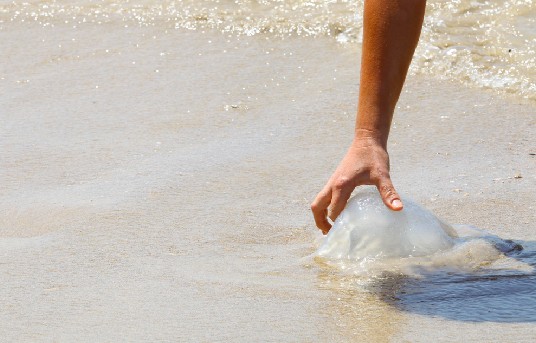Before You Head to the Beach: Essential Jellyfish Safety Tips
Jellyfish swarms have arrived on Israeli shores. How can you protect yourself, and what should you do if stung?
 Jellyfish Danger (Photo: Chen Leopard / Flash 90)
Jellyfish Danger (Photo: Chen Leopard / Flash 90)The jellyfish swarms that make their way to the shores of Israel each year are a well-known and troubling sign of summer. The jellyfish perceives the swimmers as prey, extending its tentacles, which contain thousands of stinging venom cells, toward them.
Although a jellyfish sting usually causes only a mild burn, if a large area of the body is affected, extensive medical treatment may be necessary.
Guide for the Stung:
1. Exit the water
2. Rinse the sting site
3. Apply compresses specifically made of seawater to the sting site. The reason for using seawater instead of tap water is the salinity of the seawater, which will prevent the jellyfish venom from spreading over the affected area. Conversely, regular water might widen the contact area between the skin and the jellyfish's venom cells.
4. Once you arrive home, continue with compresses using household vinegar at a five-percent concentration for at least 20 minutes. The weak acid in the vinegar will neutralize and break down the jellyfish venom.
 Jellyfish Danger (Photo: Chen Leopard / Flash 90)
Jellyfish Danger (Photo: Chen Leopard / Flash 90)5. Remove all residual jellyfish particles from the skin with a stick or piece of plastic to eliminate all venom. Avoid rubbing the sting area to prevent worsening the venom's penetration.
6. When the sting site is completely clean and the skin is only slightly reddened, you can apply soothing products containing aloe vera or calendula. These medicinal plants, if purchased as a gel, allow for quick and efficient absorption, resulting in relief and expedited healing. A mixture of baking soda or talc with seawater, or using ice wrapped in a towel, will also ease discomfort.
To protect yourself before being stung, pay attention to whether there is a purple flag on the beach. The purple flag, a new initiative by lifeguards, warns that there is a jellyfish swarm on the beach.
Additionally, apply sunscreen products with filters that repel jellyfish venom. Enter the sea only with swimming goggles to spot jellyfish and avoid direct contact with them. It is recommended to wear full-body swimwear to minimize skin contact with the venom.

